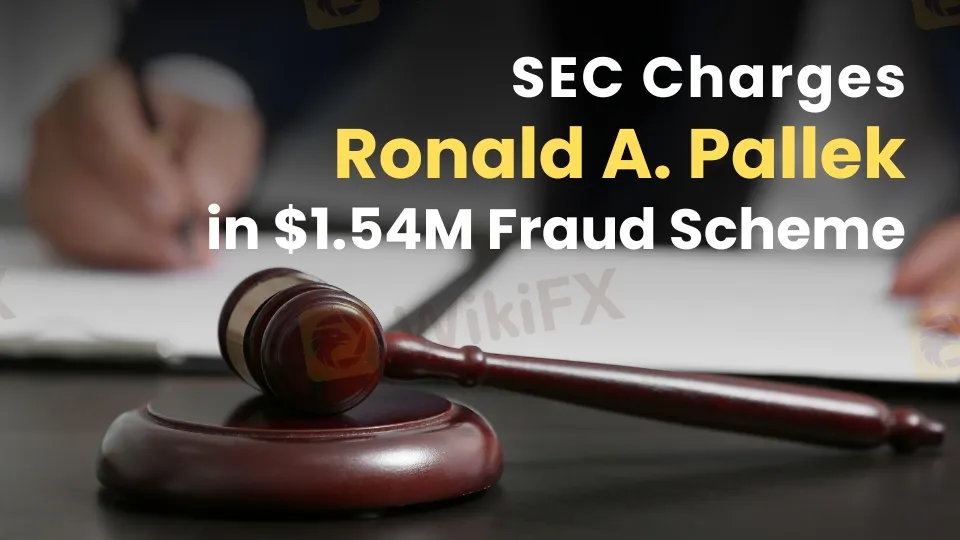简体中文
繁體中文
English
Pусский
日本語
ภาษาไทย
Tiếng Việt
Bahasa Indonesia
Español
हिन्दी
Filippiiniläinen
Français
Deutsch
Português
Türkçe
한국어
العربية
SEC Charges Ronald A. Pallek in $1.54 Million Fraudulent Investment Scheme
Abstract:SEC sues Ronald A. Pallek for a $1.54M fraudulent scheme, alleging false promises and Ponzi-like payments to investors.

The Securities and Exchange Commission (SEC) has launched a legal battle against Ronald A. Pallek, accusing him of masterminding a deceptive securities fraud scheme that swindled over $1.54 million from unsuspecting investors. The complaint, filed on March 10, 2025, in the Wisconsin Eastern District Court, paints a grim picture of greed and betrayal spanning from February 2021 to September 2023.
Pallek allegedly lured at least 87 investors with the tantalizing promise of doubling their money in just one year through an options trading strategy known as the “Iron Condor.” But behind the bold claims was a web of lies. The SEC asserts that Pallek misrepresented the risks tied to his trading tactics, fabricated details about how investor funds would be used, and even assured people he had a safety net of reserve funds to offset losses—none of which was true.

The reality was far bleaker. Palleks trading ventures hemorrhaged nearly $991,000, a fact he concealed by sending investors falsified account statements that boasted fictitious profits. To keep the illusion alive, he siphoned some of the incoming cash to pay early investors in a classic Ponzi-like maneuver, delaying suspicion as his scheme unraveled.
When desperate investors demanded their money back in the fall of 2023, Palleks excuses grew bolder. He claimed his bank accounts were frozen—a lie bolstered by forged documents he crafted to show balances exceeding $1.25 million. In truth, the funds were long gone, squandered on failed trades or redirected to prop up his crumbling facade.
The SEC has charged Pallek with violating key provisions of U.S. securities laws, including Section 17(a) of the Securities Act of 1933, Section 10(b) of the Securities Exchange Act of 1934, and multiple related rules under the Investment Advisers Act of 1940. The agency is now pushing for a permanent injunction to halt his fraudulent activities, alongside demands for disgorgement of ill-gotten gains, prejudgment interest, and hefty civil penalties.

Disclaimer:
The views in this article only represent the author's personal views, and do not constitute investment advice on this platform. This platform does not guarantee the accuracy, completeness and timeliness of the information in the article, and will not be liable for any loss caused by the use of or reliance on the information in the article.
Read more

Mumbai Police Nabs Black Paper Dollar Conversion Forex Scam Perpetrators: Check Out the Details
The crime branch of the Mumbai Police has nabbed a racket involved in duping people by claiming to convert black paper into dollars. Check this unique 24.7-lakh scam story.

Risk Involved with Cabana Capital – Every Trader Should Know
Cabana Capital has changed its name and logo, basically everything about its identity. This seems a bit suspicious, and it's something you should definitely be concerned about. In this article, you’ll learn about the red flags that every trader needs to watch out for.

Scam Brokers Exposed! FCA Warns Traders to Stay Safe
If you are into forex trading, you need to protect your money from investment scams. Many scam brokers are active in the market now. The FCA, a reputed financial regulator, has issued a list of unlicensed brokers you need to stay away from.

LiteForex – 5 Key Things You Must Know About This Broker
LiteForex , claims that it is a safe platform to invest with. It highlights only the positive aspects of the broker. But as a trader or investor, you need to verify whether everything the broker claims is actually true?
WikiFX Broker
Latest News
US Government Interest Grows in Victory Metals’ Rare Earths Supply
How Are Trade Policies Affecting the Aluminum Market?
RM71,000 Lost in a Share Scheme That Never Existed
Scammed by a Click: He Lost RM300,000 in a Month
Manual vs. Automated Forex Trading: Which One Should You Choose?
Revealing Factors That Help Determine the Gold Price in India
Why Regulatory Compliance Is the Secret Ingredient to Trustworthy Forex Brokers
Pentagon to become largest shareholder in rare earth miner MP Materials; shares surge 40%
Delta shares jump 12% after airline reinstates 2025 profit outlook as CEO says bookings stabilized
Delta shares jump 13% after airline reinstates 2025 profit outlook as CEO says bookings stabilized
Currency Calculator


